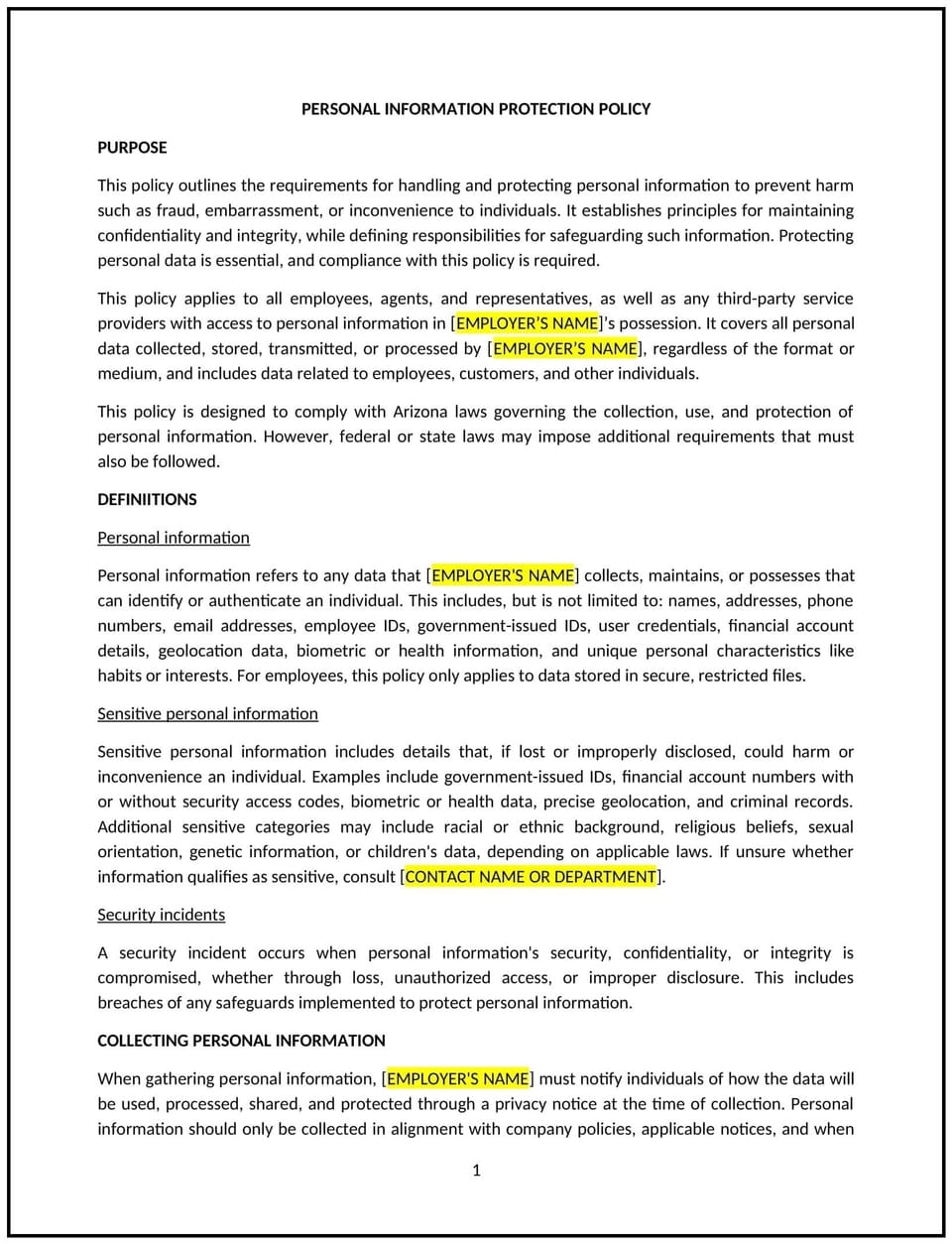Personal information protection policy (Arizona): Free template

Personal information protection policy (Arizona)
In Arizona, a personal information protection policy provides guidelines for safeguarding employees’, clients’, and customers’ sensitive information. This policy supports compliance with Arizona-specific laws, such as the Arizona Data Breach Notification Law, and federal regulations while promoting trust and transparency.
This policy outlines data handling practices, security measures, and protocols for responding to potential breaches. By implementing this policy, Arizona businesses can protect sensitive information, reduce legal risks, and maintain customer confidence.
How to use this personal information protection policy (Arizona)
- Define personal information: Clearly identify the types of data covered under this policy, such as Social Security numbers, financial records, and contact details.
- Establish data handling procedures: Provide guidelines for securely collecting, storing, and disposing of sensitive information.
- Implement access controls: Restrict access to personal information based on job responsibilities and enforce authentication protocols.
- Include breach response protocols: Outline steps for identifying, reporting, and mitigating data breaches, including notification requirements under Arizona law.
- Provide training: Educate employees on their responsibilities for protecting personal information and recognizing potential security threats.
Benefits of using a personal information protection policy (Arizona)
This policy offers several advantages for Arizona businesses:
- Enhances security: Protects sensitive data from unauthorized access, breaches, or misuse.
- Builds trust: Demonstrates the company’s commitment to safeguarding personal information, fostering confidence among stakeholders.
- Supports compliance: Aligns with Arizona’s data protection laws and federal regulations, reducing the risk of penalties.
- Reduces risks: Establishes proactive measures to identify and address vulnerabilities in data handling practices.
- Promotes accountability: Clarifies employees’ roles and responsibilities in protecting personal information.
Tips for using a personal information protection policy (Arizona)
- Address Arizona-specific requirements: Reflect the state’s data breach notification laws, including timeframes and notification content.
- Leverage technology: Use encryption, secure backups, and access controls to enhance data security.
- Partner with vendors: Ensure third-party vendors handling sensitive data comply with the company’s security standards.
- Monitor compliance: Conduct regular audits to identify potential weaknesses and ensure adherence to the policy.
- Review regularly: Update the policy to reflect changes in technology, laws, or business practices.
Q: What types of personal information are covered under this policy?
A: The policy includes sensitive data such as Social Security numbers, financial records, medical information, and contact details.
Q: How does the company protect personal information?
A: The company employs security measures such as encryption, access controls, secure storage, and employee training to safeguard sensitive data.
Q: What steps should the company take in case of a data breach?
A: The company must follow its breach response protocol, which includes identifying the breach, mitigating risks, notifying affected individuals, and reporting to authorities if required under Arizona law.
Q: Are third-party vendors required to comply with this policy?
A: Yes, vendors with access to personal information must adhere to the company’s security standards and may be required to sign data protection agreements.
Q: How does this policy support compliance with Arizona laws?
A: The policy aligns with Arizona’s Data Breach Notification Law and federal regulations to protect sensitive information and ensure legal compliance.
This article contains general legal information and does not contain legal advice. Cobrief is not a law firm or a substitute for an attorney or law firm. The law is complex and changes often. For legal advice, please ask a lawyer.


